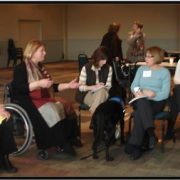water matters

Join the Smithsonian Center for Education and Museum Studies for FREE online webinars around the theme of water. These are great events to share with your local teachers, educators and students.
In February, March, and May, the Smithsonian will look at water, the most essential of subjects, from many points of view, from marine biology to American history. Explore both water quality (how we can ensure that water is safe for ourselves and for the environment) and water quantity (how we can manage crises of too much water and not enough water).
We invite you to take part with your K-12 class, or on your own as professional development. The Shout program addresses curriculum standards for ecological, social, and economic systems; human impact on the environment; and civic responsibility.
Free registration is now open.
Here’s some details to “wet” your appetite for learning!
Teacher Preview Session
January 19, 2012, 3pm EST
Get ready to make the most of the Shout: “Water Matters” program by signing up now for the teacher preview session on Thursday, January 19, 2012 at 3 pm ET. If you cannot participate live, a recording will be made available following the live event for your enjoyment at any time. You’ll learn about Smithsonian classroom resources, interact with other teachers who are also incorporating the SHOUT program into their curriculum, and discover how to stay connected through various social media sites. This online preview will allow you to plan ahead for the upcoming conference sessions and will be a forum for discussion of incorporating global environmental issues into the classroom.
Water Questions: When We Want to Learn More
February 7-8, 2012
For the full program for February 7-8, visit: https://www.smithsonianconference.org/shout/program-2012/
Topics to be Covered include:
Planet Water
What kinds of human interventions can help the health of marine life?
It’s Not Easy Being Amphibian: The Importance of Water
How does water quality and quantity relate to conserving amphibians in captivity and the wild?
Listening to the Water Nations
How do Indigenous peoples perceive and respond to water issues?
A Look Back at Music as an Environmental Advocacy Approach
How can music build awareness of environmental issues?
Looking at Global Water Resources from Space
What can orbiting satellites tell us about Earth’s greatest resource?
The Nitrogen Problem: Causes and Remedies
How can our actions affect coastal waters and the cycle of an essential element?
Sink or Float: Water and Design Solutions
How does design solve problems of individuals and communities around the world in sustainable ways?
Stay Connected:
Twitter: twitter.com/shoutlearning
Facebook: facebook.com/shoutlearning
 This event is part of Shout, a collaboration between the Smithsonian Institution, Microsoft Partners in Learning, and TakingITGlobal. More at www.shoutlearning.org.
This event is part of Shout, a collaboration between the Smithsonian Institution, Microsoft Partners in Learning, and TakingITGlobal. More at www.shoutlearning.org.
SEE YOU THERE!




